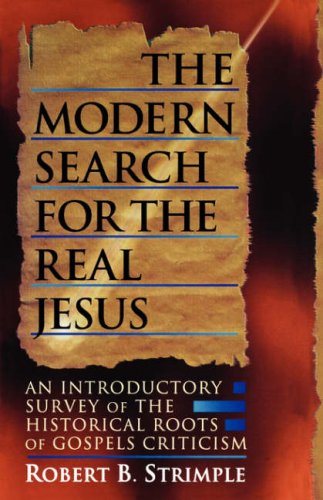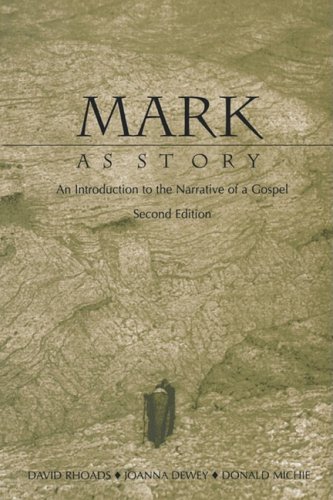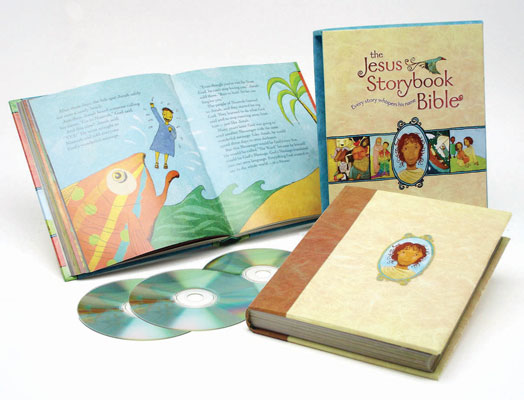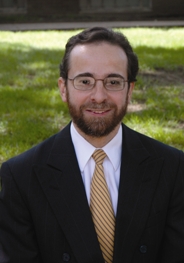Amazon Link: The Modern Search for the Real Jesus

Summary
The Modern Search for the Real Jesus is an introductory survey of the historical roots of “Gospels Criticism,” as it has been done since the enlightenment. The book is written by Robert B. Strimple. The basic outline of the book starts in the 18th century and develops the first stages of Gospels Criticism, which has come to be known as the “Old Quest” for the historical Jesus. This quest was basically terminated with the likes of Albert Schweitzer and some rationalist critics who saw the “Old Quest” as fundamentally flawed in its approach to the historical nature of the Gospels themselves. Then, finally in the 20th century, Rudolf Bultmann appeared and gave a ‘watershed’ theory that would ultimately result in a “New Quest” for the historical Jesus. If I could summarize the book into funny categories, I would divide Strimple’s history of ‘Modern’ Gospels Criticism into these three basic categories: 1) Finding your own personal Jesus, 2) Burning everyone’s Personal Jesus, and 3) Solo Fide (Only Faith) – Jesus doesn’t matter anymore. Yes, that is how I felt after I read through the book and processed the basic thought patterns of each transformation of Gospels Criticism. Ultimately, instead of trying to summarize what each person said and thought, the most important thing to understand about Gospels Criticism is that everyone basically subscribed to three principles of history: 1) Any historical work can never be sure, it is only ‘probable’ that something happened, 2) If we cannot see it duplicated today, then it never could have happened in the past (i.e. – no miracles, resurrections, etc.), and 3) Every effect has to have a sufficient cause. Given these three principles, it should become clear that any ‘divine’ activity is strictly prohibited from being ‘known’ in history.
Positives
The full worth of this book should be seen in the comprehensive understanding that is given to every figure addressed throughout the book. Each person’s primary methodology in Gospels Criticism is clearly explained with the practical implications laid out for each. I especially enjoyed all the comments by Strimple throughout the book that he set in parentheses (). It became clear, after reading the first two parts of the book, why Strimple divided the various critics into the areas noted above. The “Old Quest” really was obsessed with creating Jesus in their own personal image. Then the “Old Quest” ended in flames with the old critics being called on the carpet for making Jesus in their own image. Finally, the last portion of the book, resolved the events of the burning of the old quest by showing how Bultmann and his disciples embraced the fruits of rationalistic historical criticism – since you really cannot know anything about the ‘historical’ Jesus, a radical faith (without Jesus) is the only real means of finding personal fulfillment in studying the Gospel writings.
One of the more helpful aspects of understanding the “Old Quest” is what Strimple calls their ‘apologetic’ purpose. The very first two critics Strimple mentions saw themselves as apologists for Christianity given the new era of rationalistic enlightenment. In their sincerity, they saw themselves as making Christianity palatable for a modern person who didn’t know what to do with all the miracles and faith claims of the Bible. But this of course lead these early critics to deny the very heart of the good news of Jesus – that he not only died for sins but that he was resurrected from the dead and lives today in heaven, at the right hand of God, saving people from Satan, death, and sin through the work of his Spirit. That is where the liberal critics step in. Knowing that most of the things that were important to historic, orthodox Christians were now gutted from the Gospel accounts, these liberal critics sought to reconstruct Jesus into a ‘real’ historical figure that people could actually appreciate and follow after – since after all, everyone knows that Jesus had to be a great guy – even though his followers added all that non-historical data to his life in the Gospel accounts. But in the end, they only made Jesus look like themselves (i.e. – a deist, a Hegelian, or a liberal protestant) Strimple, in effect, captures the heart of each Gospels critic as he traces their work through to their ultimate conclusions. This leads us to the last two sections of the book.
Strimple very clearly lays out the downfall of the “Old Quest” by means of the skeptical “radical” critics and the climactic work of Albert Schweitzer. Thus, the downfall of the “Old Quest” can be categorized by two claims from the ‘fire-starters’ noted above: 1) The Gospels were heavily influenced by followers of Jesus, so much so that they are primarily theological works, not historical work. 2) The “Old Quest” critics ended up reconstructing the life of Jesus to look a lot like their own worldviews, which was essentially the same thing the “Old Questers” were accusing the Gospel writers of doing to Jesus! This second claim is one of the only positive things that Albert Schweitzer gave to the history of Gospels Criticism.
Finally, in the last portion of the book, Strimple gives us a very helpful picture of the Bultmann’s thinking and how he and his disciples proceeded to embrace the ultimate futility of the modern Gospels Criticism movement. First, I would like to note the partial ‘breath of fresh air’ that I experienced when reading the sixth chapter on Martin Kähler, the supposed forerunner to Bultmann. Kähler’s work, while not affirming the inerrancy of Scripture, seemed to be thoroughly affirming of orthodox Christian doctrine and faith. But, in the end, his impact on Gospels Criticism was not revival. It was instead food for thought that pushed Bultmann to the conclusions that he drew. Strimple strongly presents the ultimate foolishness of Bultmann’s existential and a-historical conclusions about the Jesus of history. Recalling my third section title in the summary above, Bultmann basically proposed that faith is the only means for a person to be justified in seeking out a life of ‘authentic existence.’ This is the concept of ‘solo’ fide – only faith – where Bultmann concluded that knowing the history of Jesus didn’t matter. Instead, what the Gospel writers were trying to accomplish was to show their reads how to live a truly authentic life. And that authentic life could come in any form, not just Christian religion. Thus, it was the ‘left-wing’ disciples of Bultmann who really ‘got it’ and carried out Bultmann’s conclusions to their ultimate end – ‘who cares about Jesus anymore, we just want an authentic existence!’
Negatives
I found only two negatives in this survey of Modern Gospels Criticism: 1) Strimple did not always connect the three parts together very clearly as he structured the book into chapters. Yes, he made it clear why he segregated the book into the three parts, but as I read, the information was sometimes so much that I did not always track with who came first and why someone influenced another person. It might just be the case that undertaking any such survey like this is always prone to that weakness. 2) Though I attribute this second issue to when Strimple wrote the book, I would have liked to have seen a fourth section covering what has more recently been called the “Third Quest” for the historical Jesus. The book dates itself by not addressing anything beyond what has taken place directly after Bultmann.
Conclusion
The Modern Search for the Real Jesus is a short, yet comprehensive, book that will accurately introduce a well read student of the Bible to the historical roots of Gospels Criticism. I say ‘well read’ because the book contains several references to the German language and also deals with fine distinctions and critical methodology. This book is primarily going to benefit someone seeking to be a pastor or Bible scholar, both of whom will run into these methods and conclusions in much of the scholarly commentary work done on the Gospels today.






